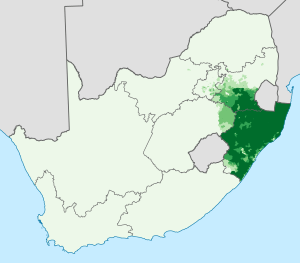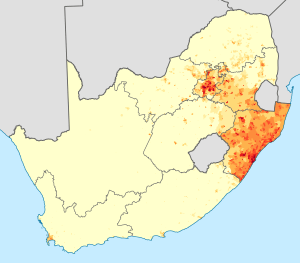Zulu language facts for kids
Quick facts for kids Zulu |
||||
|---|---|---|---|---|
| isiZulu | ||||
| Native to | South Africa, Lesotho, Swaziland | |||
| Region | KwaZulu-Natal, eastern Gauteng, eastern Free State, southern Mpumalanga | |||
| Native speakers | 12 million (2011 census)e18 L2 speakers: 16 million (2002) |
|||
| Language family |
Niger–Congo
|
|||
| Writing system | Latin (Zulu alphabet) Zulu Braille |
|||
| Official status | ||||
| Official language in | ||||
| Regulated by | Pan South African Language Board | |||
| Guthrie code | S.42 | |||
| Linguasphere | 99-AUT-fg incl. varieties 99-AUT-fga to 99-AUT-fge |
|||

Proportion of the South African population that speaks Zulu at home
0–20% 20–40% 40–60% 60–80% 80–100% |
||||
|
||||
Zulu or isiZulu (Zulu: isiZulu) is the language of the Zulu people. 10 million people speak Zulu, and most of them (95%) live in South Africa. It is the most common home language in South Africa, where 24% of people speak it at home. Over 50% of the population also speak and understand the language.
In 1994, it became one of South Africa's 11 official languages. Like other Bantu languages, Zulu is written using the Latin alphabet.
Contents
Where it is spoken

| 0–20% 20–40% 40–60% | 60–80% 80–100% |

| <1 /km² 1–3 /km² 3–10 /km² 10–30 /km² 30–100 /km² | 100–300 /km² 300–1000 /km² 1000–3000 /km² >3000 /km² |
Zulu belongs to the Nguni group of Bantu languages. Zulu migrants (people who move from place to place) have taken the language to other regions. There are now Zulu speakers in Zimbabwe, Lesotho, Mozambique, Malawi, and Swaziland.
Zulu speakers in Zimbabwe speak a dialect called "Northern Ndebele language."
People who speak Xhosa can understand most Zulu. The opposite is also true: Zulu speakers can understand Xhosa. Xhosa language is the most common language spoken in the Eastern Cape of South Africa.
History
The Zulu, Xhosa, and other Nguni people have lived in South Africa for a long time. The Zulu language has a lot of click sounds common in Southern African languages. These click sounds are not found in the rest of Africa. The Nguni people have lived together with other Southern tribes like the San and Khoi.
Zulu and all other native Southern African languages was at first an oral language. It was not written down until missionaries came from Europe. These missionaries used the Latin alphabet to write the Zulu language. The first Zulu grammar book was published in Norway in 1850 by Hans Paludan Smith Schreuder.
The oldest document written in Zulu is a Bible from 1883. John Dube, a Zulu from Natal, wrote the first Zulu novel, Insila kaShaka, in 1933. Another important Zulu author was Reginald Dhlomo. Dhlomo wrote U-Dingane (1936), U-Shaka (1937), U-Mpande (1938), U-Cetshwayo (1952) and U-Dinizulu (1968). Other important Zulu writers are Benedict Wallet Vilakazi and Oswald Mbuyiseni Mtshali.
Before 1994, the Zulu language was controlled by the Zulu Language Board in KwaZulu-Natal. Today, the Pan South African Language Board supports the use of all 11 official languages of South Africa.
Use today
Before 1994, the official languages of South Africa were English, Dutch, and Afrikaans. During Apartheid, Zulu was spoken commonly in the Kwazulu bantustan. All education, however, at the high school level was in English or Afrikaans.
After Apartheid ended in 1994, Zulu became one of the official languages in South Africa. The SABC first started showing Zulu-language television and news programs in the 1980s. There are many Zulu radio stations and newspapers available, mostly in the Kwazulu-Natal province and Johannesburg. The first full-length feature film in Zulu was Yesterday. It was made in 2004 and nominated for an Academy Award (Oscar).
In The Lion King movie, the "Circle of Life" song has many Zulu phrases in it. Some of these phrases are:
- Ingonyama nengw' enamabala (A lion and a leopard come to this open place)
- Nants ingonyama bakithi Baba' (Here comes a lion, Father)
- Siyo nqoba (We will conquer)
Other Lion King songs also had Zulu phrases in them.
Standard and urban Zulu
There are two main types of Zulu. One type is called standard Zulu, and it is taught in schools. Standard Zulu is also called "deep Zulu" (Zulu: isiZulu esijulile). Standard Zulu is a purist language. This means that new ideas are described using words that are derived from other Zulu words.
The other type of Zulu is called urban Zulu (Zulu: isiZulu sasedolobheni). Urban Zulu is the kind of Zulu spoken by people who live in cities. Urban Zulu uses loan words borrowed from other languages to describe new ideas. Most of these loan words come from English.
Some of these different words for new ideas in Standard and Urban Zulu are listed here:
| Standard Zulu | urban Zulu | English |
|---|---|---|
| umakhalekhukhwini | icell | cell/mobile phone |
| Ngiyaqonda | Ngiya-understanda | I understand |
These two different types of Zulu language make problems in learning and education. Young people speak urban Zulu and do not often understand standard Zulu.
Phrases
This is a list of phrases in Zulu.
| Sawubona | Hello, to one person |
| Sanibonani | Hello, to a group of people |
| Unjani? / Ninjani? | How are you (one person)? / How are you (many people)? |
| Ngisaphila / Sisaphila | I'm okay / We're okay |
| Ngiyabonga (kakhulu) | Thank you (very much) |
| Ngubani igama lakho? | What is your name? |
| Igama lami ngu... | My name is... |
| Isikhathi sithini? | What's the time? |
| Ngingakusiza? | Can I help you? |
| Uhlala kuphi? | Where do you stay? |
| Uphumaphi? | Where are you from? |
| Hamba kahle / Sala kahle | Go well / Stay well (used as goodbye) |
| Hambani kahle / Salani kahle | Go well / Stay well, to a group of people |
| Eish! | Wow! |
| Hhayibo | No! / Stop! / No way! |
| Yebo | Yes |
| Cha | No |
| Angazi | I don't know |
| Ukhuluma isiNgisi na? | Do you speak English? |
| Ngisaqala ukufunda isiZulu | I've just started learning Zulu |
Common place names in Zulu
Zulu place names occur in the locative form most of the time. A place name is both a preposition and a name. Changing the prefix of the place name changes the preposition.
For example, the Zulu name for Johannesburg is iGoli. The word eGoli means to/at/in/from Johannesburg. The root word Goli means "Johannesburg," but doesn't mean anything by itself in Zulu.
Most of the time, changing the i- or u- prefix to the e- prefix changes the meaning like this. In some cases, like with Durban, the name changes too.
| English place | Zulu place name (Locative) |
to/at/in/from Zulu place name |
|---|---|---|
| Durban | iTheku | eThekwini |
| Johannesburg | iGoli | eGoli |
| Cape Town | iKapa | eKapa |
| Pretoria | iPitoli | ePitoli |
| Pietermaritzburg | uMgungundlovu | eMgungundlovu |
| Ladysmith | uMnambithi | eMnambithi |
'Zulu' or 'isiZulu'?
The Zulu name for the language is isiZulu. The isi- prefix means "language." (It also means other things, but here it means language.) For example, isiNgisi means English, isiXhosa means Xhosa, isiBhunu means Afrikaans, and isiJalimane means German.
When the word Zulu has a prefix that is not "isi-", it means a lot of different things. This is a table that shows how the meanings of the word changes:
| Prefix | Word | Meaning |
|---|---|---|
| um(u) | umZulu | a Zulu person |
| ama, aba | amaZulu | Zulu people |
| isi | isiZulu | the Zulu language |
| kwa | kwaZulu | place of the Zulu people |
| i(li) | izulu | the weather/sky/heaven |
| pha | phezulu | on top |
| e | ezulwini | in/at/to/from heaven |
Zulu words in South African English
Many Zulu words are used in South African English. Some words, like the names of local animals, are used in standard English. Impala and mamba, for example, are zulu words. Some Zulu words used in South African English are:
- Muti (from umuthi) - medicine
- Donga (from udonga) - ditch (udonga actually means 'wall' in Zulu)
- Indaba - conference (it means 'an item of news' in Zulu)
- inDuna - chief or leader
- Shongololo (from ishongololo) - millipede
- Ubuntu - compassion/humanity.
See also
 In Spanish: Idioma zulú para niños
In Spanish: Idioma zulú para niños

